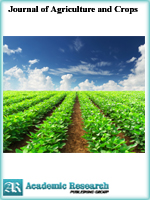Journal of Agriculture and Crops
Online ISSN: 2412-6381
Print ISSN: 2413-886X
Print ISSN: 2413-886X
Quarterly Published (4 Issues Per Year)

Archives
Volume 6 Number 7 July 2020
Determinants of Cocoa (Cacao Theobroma) Farmers Uptake of Crop Insurance: Evidence from Ekiti State
Authors: Olatomide Waheed Olowa ; Omowumi Ayodele Olowa
Pages: 96-104
DOI: doi.org/10.32861/jac.67.96.104
Abstract
Cocoa farmer faces increasing challenging environment through exposure to risks factors which have impacted negatively on their production or output. Since farmers are primary producers and often times lack capacity to control risks factor, it is important to manage this factors. This study examines the cocoa farmers’ risk preferences and crop insurance perception and isolates the drivers of decision to uptake crop insurance among cocoa farmers in Ekiti state. The sample for the study consist of 200 cocoa farmers who were household heads selected through multi-stage sampling across four Local government areas of Ekiti State who are predominantly cocoa producers. Data collected on socio-demographic characteristics, perception of crop insurance and risk preferences, were analyzed using descriptive statistics and binary logistic model. Results showed that majority of the cocoa farmers were without crop insurance, with higher enrolment in Membership of cooperative society, owned their land, larger household size and lower educational level but higher level of farm experience when compared to cocoa farmers who are holding crop insurance. Farmers risk preferences showed no significant difference between farmers with or without insurance. Education (β=0.59), Household size (β=0.0029) and Debt use (β=0.02), Membership of cooperative (β=-4.53), Farming Experience (β=-2.51), Owned Land (β=-2.19) and Non-Farm Income (β=-0.65) were among the significant determinants of insurance uptake. Risk mitigating measures such as provision of necessary incentives such as improved varieties of cocoa seedling, as well as provision of fertiliser and approved pesticides, financial assistance, and simple processing technologies that produce standard cocoa bean plus a re-jigged Nigeria Agricultural Insurance Corporation (NAIC) for an improved discharge of its function are recommended.
Creation of Net Zero Carbon Emissions Agricultural Greenhouses Due to Energy Use in Mediterranean Region; Is it Feasible?
Authors: John Vourdoubas
Pages: 89-95
DOI: doi.org/10.32861/jac.67.89.95
Abstract
Mitigation of climate change requires the decrease of greenhouse gas emissions into the atmosphere and the increasing use of renewable energies replacing fossil fuels. Agricultural greenhouses are energy-intensive agricultural systems using mainly fossil fuels. The use of renewable energies during their operation is limited so far. The possibility of using renewable energies for covering their energy needs has been investigated, focused on the Mediterranean region. Various sustainable energy technologies which are reliable, mature, cost-effective and broadly used in various applications are examined. These include solar-PV systems, low enthalpy geothermal energy, solid biomass burning, co-generation systems, high efficiency heat pumps and reuse of rejected industrial heat. Combined use of these systems in greenhouses can cover all their energy requirements in heat, cooling and electricity, reducing or zeroing their net CO2 emissions into the atmosphere due to operational energy use. It is concluded that depending on their local availability in Mediterranean countries, these benign energy technologies can assist greenhouse crop growers in the reduction of their carbon emissions, contributing in the achievement of the universal goal for climate change mitigation.



